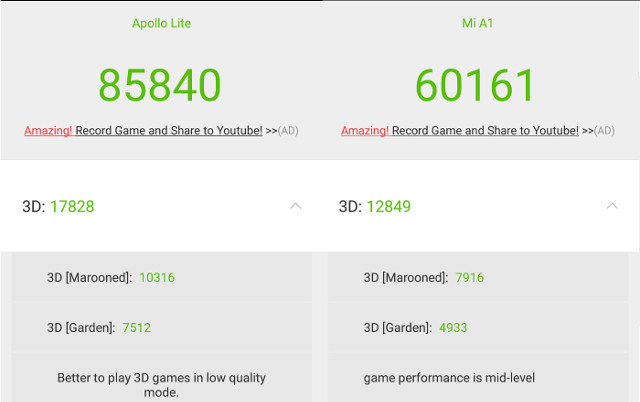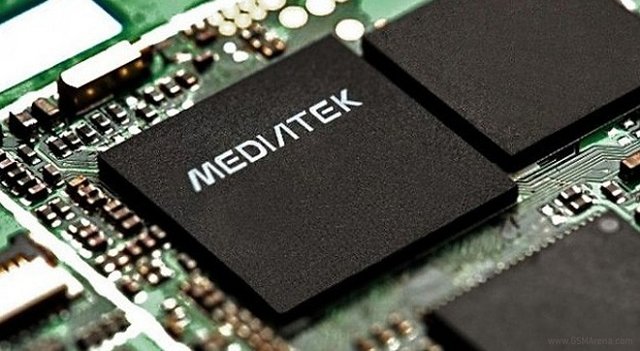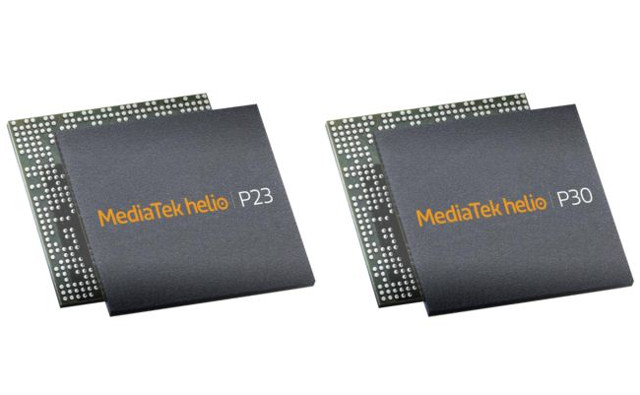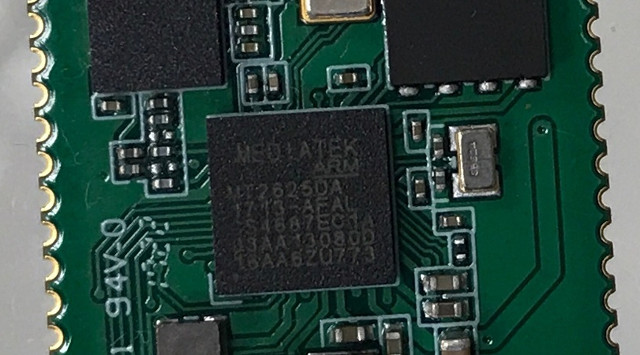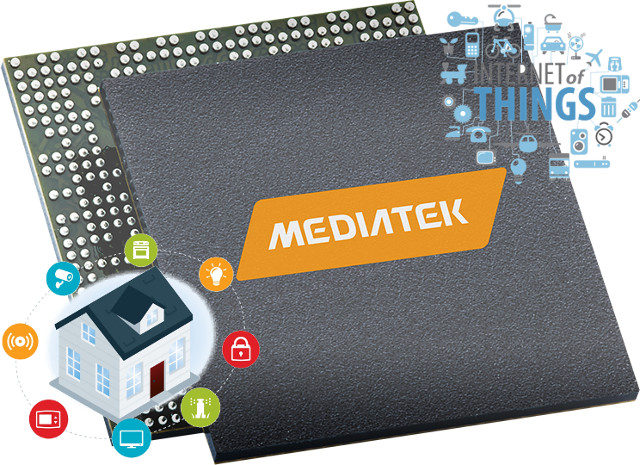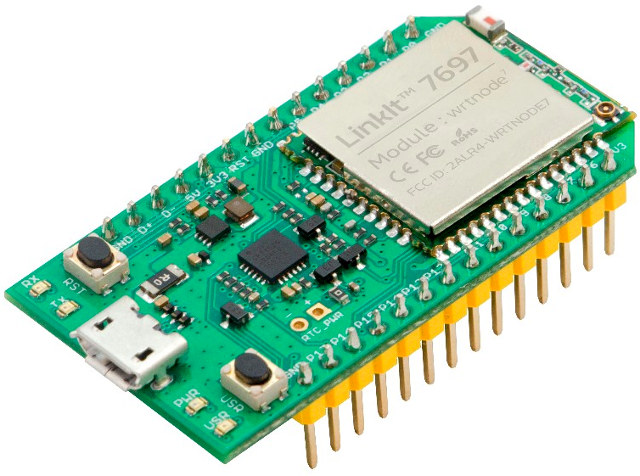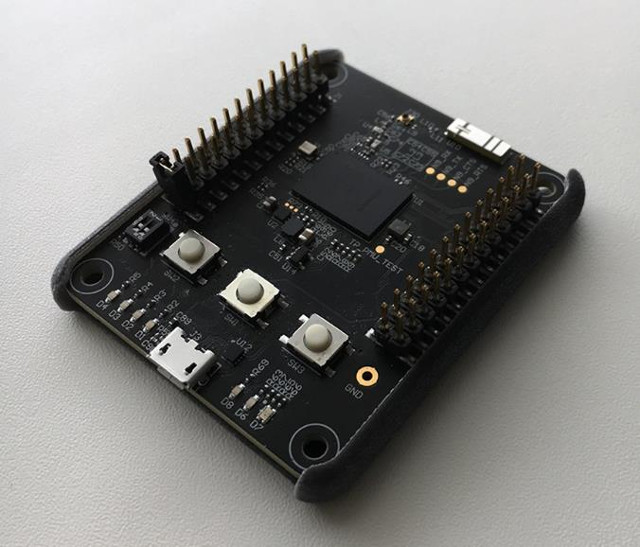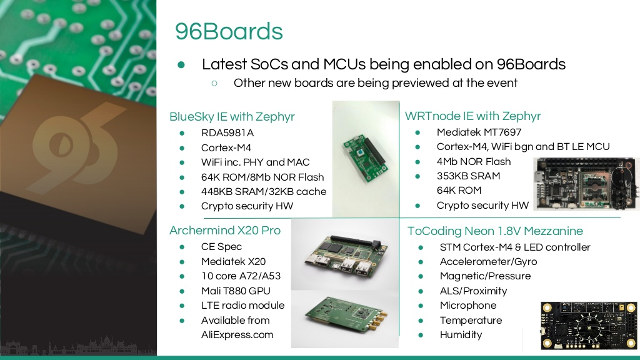I’ve been using Vernee Apollo Lite smartphone with a Mediatek Helio X20 deca-core ARM Cortex A72/A53 processor coupled with an ARM for a little over a year. Recently, I’ve received Xiaomi Mi A1 smartphone for a Qualcomm Snapdragon 625 SoC featuring eight ARM Cortex A53 cores and an Adreno 506 GPU. In theory, the latter is a downgrade, and the Xiaomi phone is indeed quite slower in Antutu with overall score of 60,161 points against 85,840 points in the Mediatek phone. 3D graphics performance is also lower with 12,849 vs 17,828 points. Both smartphone have the same resolution (1920×1080), so it’s a little confusing to be told you’d “better to play games in low quality mode” for the Mediatek phone, and “game performance is mid-level” for the Snapdragon one. But anyway Helio 20 should work better in 3D games than Snapdragon 625 if we are to believe the numbers. Most […]
Mediatek MT6739 Launched for Entry-Level 4G Smartphones with 18:9 Displays
India Mobile Congress 2017 took place in New Delhi this week, and at the event, Mediatek officially launched Helio P23 processor (in India), as well as a new MT6739 SoC with a quad core Cortex A53 processor, Imagination PowerVR GE8100 GPU, an a LTE Cat.4/5 modem for entry level 4G LTE smartphones. Mediatek MT6739 specifications: CPU – 4x ARM Cortex-A53 cores clocked up to 1.5GHz GPU – Imagination PowerVR GE8100 GPU @ 570 MHz with System Memory – LPDDR3-667MHz up to 3GB Storage – eMMC 5.1 Flash Display – up to 1440 x 720 (18:9 aspect ratio) Camera – 13MP, dual camera supported Video Decoding – 1080p @ 30FPS, H.264/HEVC Video Encoding – 1080p @ 30FPS, H.264 Modem – 4G LTE Cat. 4 DL / Cat. 5 UL (FDD/TDD) up to 150Mbps download, 50Mbps upload, CDMA2000, L+G, L+W/L+L DSDS, eMBMS, HPUE, 600MHz band supported; Dual VolTE Connectivity: Wi-Fi 802.11a/b/g/n, Bluetooth […]
MediaTek Helio P23 & P30 Processors Unveiled for “Premium” Mid Range Smartphones
MediaTek has introduced two more octa-core Cortex A53 processors with respectively Helio P23 for worldwide markets, and Helio P30 for China. Both processors build upon Helio P20/P25 design, but are upgraded with a faster Mali G71MP2 GPU, LTE Cat 7/13 modem, and in the case of Helio P30 the ability to record 4K videos with H.265 codec, instead of just H.264, and a new “vision processing unit”. Mediatek Helio P23 & P30 specifications: CPU – 8 core big.LITTLE processor with 4x ARM Cortex A53 @ 2.3 GHz, 4x ARM Cortex A53 @ 1.65 GHz GPU – ARM Mali-G71MP2 GPU clocked @ 770 MHz (P23) or 950 MHz (P30) Memory I/F – 2 x 16-bit @ 1600 MHz LPDDR4X, P23 only: 1 x 32-bit @ 933 MHz LPDDR3 Storage I/F – No info Display – Up to 2160 x 1080 resolution Video Encoder – P23: 2160p30 H.264; P30: 2160p30 H.264 & HEVC […]
Mediatek MT2625 NB-IoT SoC is Designed for Cellular IoT Devices working Worldwide
Mediatek has recently unveiled MT2625 SoC based on an ARM Cortex-M core, equipped with an NB-IoT “WorldMode” modem allowing for a single design worldwide, and supporting the latest 3GPP Release 14 (LTE Cat NB2) specification. Mediatek MT2625 specifications: CPU – ARM Cortex-M @ up to 104 MHz with FPU Embedded Memory – 4MB PSRAM Storage – 4MB NOR Flash Connectivity NB-IoT compatible with 3GPP Release 14 Full frequency band (450MHz to 2.1GHz) of 3GPP R13 (NB1) and R14 (NB2) standards Integrated baseband, RF, and modem DSP Peripherals – I2C, I2S, PCM, SDIO, UART Power Supply – Integrated PMU The solution will be found in products for worldwide transportation, municipal use, and consumer products, with a much longer battery life compared to existing devices relying on other 2G/3G/4G standards. According to the press release, one of the first module based on MT2625 has been designed in collaboration with China Mobile, integrates […]
MediaTek Unveils MT7686, MT7682, and MT5932 WiFi SoCs for IoT and Smart Home Applications
Beside announcing MT7622 SoC for WiFi and Bluetooth 5 gateways and routers last week, Mediatek also introduced three “next generation” WiFi SoCs for the IoT and the Smart Home market during Computex 2017, namely MT7686, MT7682, and MT5932. Mediatek MT7686 is a wide temperature range WiFi SoC for appliances: MCU – ARM Cortex-M4F @ 192 MHz System Memory – 4MB + 384KB RAM Storage – 4 MB flash with XIP support Connectivity – Low-power 1T1R 802.11 b/g/n Wi-Fi subsystem Peripherals – SDIO I/F, UART, I2C, SPI, I2S, PWM, and auxiliary ADC Power Supply – Integrated Power Management Unit (PMU) Power Consumption – Connected DTIM1 <0.7mA Temperature Range – “Wide” Package – QFN48 (6x6mm) Mediatek MT7682 is promoted as a cost-effective, integrated SoC for multi-Cloud platforms: MCU – ARM Cortex-M4F @ 192 MHz System Memory – 384KB RAM Storage – 512 KB or 1 MB flash with XIP support Connectivity – […]
$14 LinkIt 7697 Bluetooth 4.2 LE and WiFi IoT Board is Powered by Mediatek MT7697 ARM Cortex-M4 MCU
Mediatek Labs has launched a new IoT development, which on the surface looks similar to LinkIt Smart 7688 board, but the internal design is quite different as the MIPS processor and Linux OS, have been replaced by Mediatek MT7697 ARM Cortex-M4 processor running FreeRTOS, and beside WiFi, also includes support for Bluetooth 4.2 LE. LinkIt 7697 board specifications: Wireless SoC – Mediatek MT7697 ARM Cortex M4F MCU @ 192 MHz with 352KB RAM, 4MB flash, 802.11 b/g/n WiFi, Bluetooth 4.2 LE and a PMU Expansion – 2x 14-pin header with 18x GPIO, 2x UART, 1x I2C, 1x SPI, 18x PWM, 4x EINT, 4x ADC (0 to 2.5V), 1x IrDA, 1x I2S Debugging – 1x SWD, CP2102 UART to USB chipset Misc – Reset and user buttons; power and user LEDs Power Supply – 5V via micro USB port Dimensions – 48 x 26 mm The board can be programmed with […]
Microsoft is Working with Mediatek on Project Sopris Secure WiFi MCU
There are serious security issues with the Internet of Things at all levels: hardware, software, network, and end-users. Microsoft Research NExT Operating Systems Technologies Group has been tasked with “exploring the goal of securing the vast number of low cost Internet connected devices coming online” with Project Sopris. They have shared their first technical report that identifies “seven properties of highly secure devices”, and describes their experiments towards designing microcontroller based prototype devices adapted from Mediatek MT7687 MIPS microcontroller, and exhibiting those seven properties. The seven properties identifies by Microsoft team include: Hardware-based Root of Trust – Unforgeable cryptographic keys generated and protected by hardware. Physical countermeasures resist side-channel attacks. Small Trusted Computing Base – Private keys stored in a hardware-protected vault, inaccessible to software. Division of software into self-protecting layers. Defense in Depth – Multiple mitigations applied against each threat. Countermeasures mitigate the consequences of a successful attack on […]
New 96Boards IoT Edition Boards Showcased at Linaro Connect 2017: BlueSky IE and WRTNode IE
Linaro Connect Budapest 2017 is taking place this week in Hungary, and during George Grey – Linaro CEO – keynote, he provided a status updates for the Linaro group, addressed some of Linaro’s criticisms from members and the community, and unveiled two upcoming boards compliant with 96Boards IoT edition both running Zephyr OS, and adding to BLE Carbon board announced last year. The first board is BlueSky IE board with the following key specifications: SoC – RDA Micro RDA5981A ARM Cortex-M4 Wireless MCU with 64KB ROM, and 32KB cache System Memory – 485KB SRAM. It’s unclear if that’s only the on-chip SRAM, and there’s also some external PSRAM added. Storage – 8Mb NOR flash 802.11 b / g / n HT20 / 40 mode Connectivity – 802.11 b/g/n WiFi with support for HT20 / 40 modes Crypto security hardware The second board is WRTnode IE: SoC – Mediatek MT7697 ARM […]


